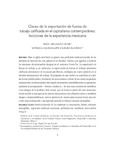
Please use this identifier to cite or link to this item:
http://ricaxcan.uaz.edu.mx/jspui/handle/20.500.11845/51| Title: | Claves de la exportación de fuerza de trabajo calificada en el capitalismo contemporáneo: lecciones de la experiencia mexicana |
| Authors: | Delgado Wise, Raúl Chávez Elorza, Mónica Guadalupe |
| Issue Date: | Jul-2015 |
| Publisher: | Universidad Autónoma de Zacatecas. Unidad Académica de Estudios del Desarrollo |
| Abstract: | Bajo la égida neoliberal se genera una profunda reestructuración de los sistemas de innovación, con epicentro en Estados Unidos, que agudiza y acentúa las relaciones de intercambio desigual en el horizonte Norte-Sur. La exportación de fuerza de trabajo y, en particular, la exportación de fuerza de trabajo altamente calificada proveniente de los países periféricos, configura un nuevo peldaño en la división internacional del trabajo. El propósito de este trabajo es contribuir al análisis de esta problemática, develando los mecanismos a través de los cuales las grandes corporaciones multinacionales han logrado incrementar ostensiblemente sus ganancias, mediante la incorporación —directa o indirecta— de una masa creciente de cien tíficos y tecnólogos de la periferia. Esta trama, que se ilustra a partir del caso mexicano, revela no sólo la emergencia de nuevos mecanismos para abaratar costos y transferir riesgos y responsabilidades, sino la apertura de canales para avanzar hacia una creciente mercantilización y apropiación privada de bienes comunes intangibles. |
| Description: | Under the neoliberal aegis, a profound restructuring of systems of innovation was carried out, from its epicentre in the United States, which intensified and accentuated unequal trade relationships along the North-South axis. The export of labor and, in particular, the export of highly-skilled labor originating in the peripheral countries, heralded a new phase in the international division of labor. The aim of this study is to contribute to the analysis of this problematic, revealing the mechanisms through which large multinational corporations have been able to significantly increase their profits through the incorporation –direct or indirect– of a growing body of scientists and technologists from the periphery. This scheme, which we illustrate using the case of Mexico, shows not only the emergence of new mechanisms to reduce costs and transfer risks and responsibilities, but also the opening of channels, moving toward a growing commercialization and private appropriation of intangible public goods. |
| URI: | http://hdl.handle.net/20.500.11845/51 |
| ISSN: | 2448-7783 |
| Other Identifiers: | info:eu-repo/semantics/publishedVersion |
| Appears in Collections: | *Documentos Académicos*-- UA Estudios del Desarrollo |
Files in This Item:
| File | Description | Size | Format | |
|---|---|---|---|---|
| Delgado-Chaves_MyD25.pdf | Versión publicada | 324,77 kB | Adobe PDF |  View/Open |
This item is licensed under a Creative Commons License
